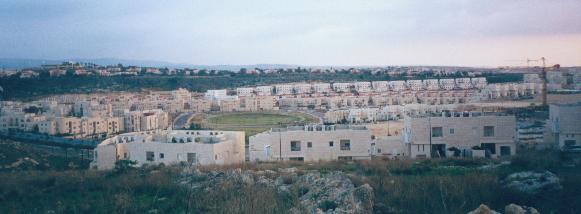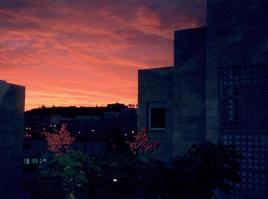
View from the Tetora Hill of the eastern neighbourhoods of Modi'in with the neighbouring town of Re'ut in the background

View from the Tetora Hill of the eastern neighbourhoods of Modi'in with the neighbouring town of
Re'ut in the background
 Modi'in at dawn |
People have moved here from many parts of Israel, in particular from Lod, Ramle, Jerusalem and Gush Dan (the greater Tel Aviv area), creating a diverse mix of residents. Modi'in's residents come from a variety of ethnic backgrounds and work in many fields, though a disproportionate number work in the professions or in technology.
Most of the population of about 60,000 are native Israelis, but there are also immigrant groups, in particular from the former Soviet Union and Latin America, French and English speaking countries, with whom the town has become especially popular in recent years. Most people in Modi'in identify themselves as traditional or secular and there is a small but very vocal group of ideological secularists. About 25% of the population are religious, mostly Orthodox of various stripes, but there are also Conservative and Reform communities.
Modi'in's convenient location has made it very popular for those who can't afford the high price of housing in the Tel Aviv and Jerusalem areas, want more space for their money or who want to escape the concrete jungle which characterises many older Israeli towns and cities. While Modi'in is designed to be mostly urban rather than suburban, it has been planned with plentiful green spaces and open areas, providing a feeling of space missing in many other Israeli towns. Maybe that's why we seem to have an unusually high population of domestic dogs.
Modi'in is well placed for commerce, about midway between Israel's capital Jerusalem and its second-largest city and largest business centre, Tel Aviv. We're also only about 15 minutes by car from Ben Gurion Airport, Israel's main international airport, and it's new high-tech industrial park, Airport City. Most residents commute to work outside Modi'in, not only in the two big cities, but also in industrial areas in the towns of Petach Tikva, Lod, Herzliya, Rosh Ha'ayin and Nes Tziona.
At the moment most commute by bus or private car, though a train connection to Ben-Gurion Airport and Tel Aviv is under construction and due to be completed in the next few years. There are also plans for a train link to Jerusalem, though whether this will actually be built is still not clear.
There are plans for a local industrial zone, High Park, primarily for "clean" industries such as software or biotechnology. At the time of writing this is under construction and work on the newest town shopping centre is slated to begin soon.
In the meantime there are several small neighbourhood shopping centres, and one, Ligad Centre, which is located beyond the currently constructed part of Modi'in, in an area slated to become an industrial zone. For now this too is mostly a retail centre, though some local businesses have, in particular legal firms, have their offices there.
For now local employers include retail, healthcare, education, catering and other service sectors.
Many Modi'in based lawyers, dentists, estate agents and others are currently working out of private apartments, due to the current shoartage of office space.
Introduction |
Location |
Historical sites in the Modi'in region|
Modern Modi'in
Population and Employment |
Services and Amenities |
Modi'in's Neighbours |
Recreation Areas
Eating Out |
Modiin area birds
Copyright 2005 by Leiah Elbaum. Text and photographs on this page are by Leiah Elbaum. Last updated 15 May 2005.